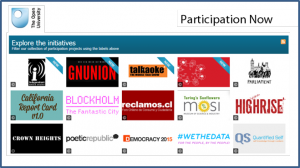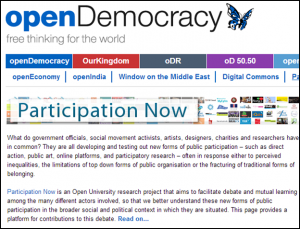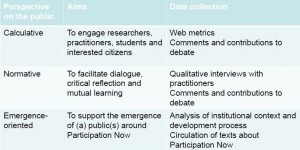Nick Mahony and Hilde Stephansen
Everywhere you look, people are talking about participation. Whether it concerns publicly engaged research; ‘people powered’ public services; customer-driven innovation; patient involvement in health; crowd sourcing; open data – we are entering a new paradigm of public involvement that is sweeping across every sector, from higher education to business. The organic nature of these developments is creating a wealth of innovation – and an urgent need for scholarship, networking and capacity building if this innovation is to be nurtured, consolidated and further developed.
An engaging research collaboration
This is where Participation Now comes in. The aim of this project is to provide an authoritative and inspiring resource as well as a robust support infrastructure for higher education researchers, practitioners as well as the growing numbers of other people who are now interested or involved in participatory public engagement.
The impetus and original idea for this new site emerges from an Open University funded research project called Creating Publics. The Creating Publics project is concerned with investigating changing configurations of ‘the public’ and how contemporary publics emerge in and through forms of participatory engagement.
The resources provided by the RCUK-funded Open University Public Engagement with Research Catalyst, ‘An open research university‘, together with collaborations forged with OpenLearn and openDemocracy.net have now helped to begin to turn this idea into a reality. Participation Now is therefore an experiment in multi-disciplinary engagement and a case study in digital and participatory engagement with research.
The Collection
The three main elements of the Participation Now site are, first, an accessible, indexed, searchable and expanding collection of over 120 contemporary examples of participatory public engagement. For researchers and others interested in participatory forms of public engagement this database brings together a collection of illustrative examples of practice drawn from the areas of government, charities, social movements, health, technology, science, arts, design as well as higher education.
A forum for debate
The second main element of Participation Now is a space of reflection where researchers and practitioners are encouraged to network and debate the possibilities and difficulties associated with different forms of emerging practice and opportunities for further innovation. 25 blog-style contributions and a series of interviews with key researchers and practitioners have already been published in this part of the site.
A space to explore the possibilities for engaged scholarship
Participation Now is, thirdly and finally, designed as a resource for research, teaching and scholarship. For example, the researchers involved in this project are already undertaking a systematic comparative analysis of the characteristics of the 120+ initiatives archived in the Participation Now collection; the site is also designed so as to enable metrics to be collected so that the use of this site can be analysed. The University of Westminster’s Politics Department has, furthermore, begun using Participation Now as a resource to help deliver an undergraduate module on ‘Democratic Innovations’.
Reflective learning about engaging research
As the researchers involved in this project we are currently devising a new evaluation framework that specifically focuses on assessing how publics are mediated through forms of participatory engagement. This framework is now being used to evaluate the Participation Now project and this framework is also one further element of the work that is being delivered as part of the OU’s RCUK-funded PER Catalyst.




